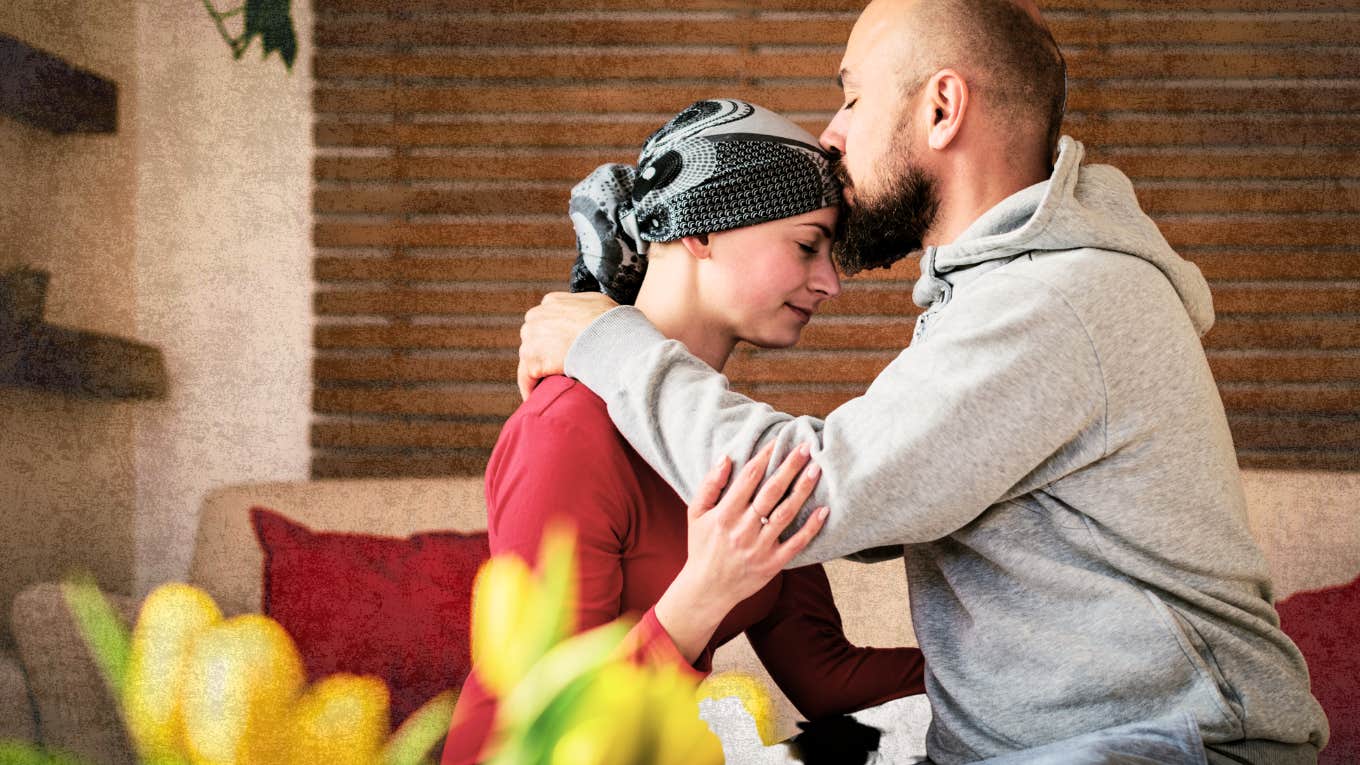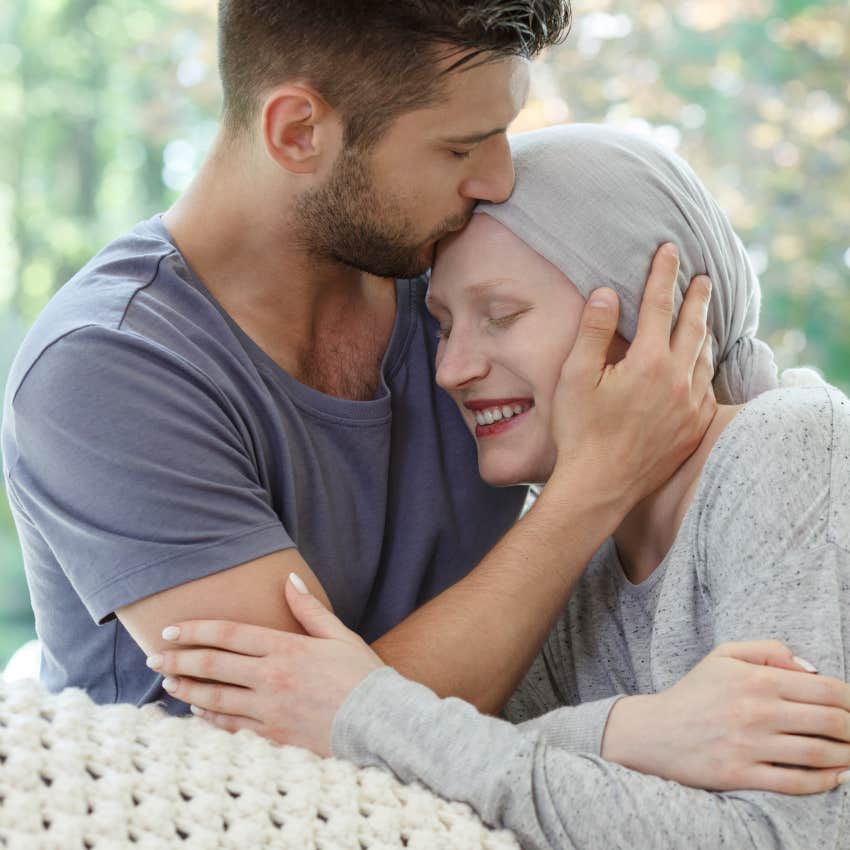She Was Never Alone: Caring For My Wife With Cancer
It was out of the question that she would face this challenge alone.
 ABO PHOTOGRAPHY | Shutterstock
ABO PHOTOGRAPHY | Shutterstock Breast cancer attacked my wife in many ways. In addition to her physical health, her self-image as a woman was set back. Chemotherapy took away her hair and her energy. It caused diarrhea, taking away her dignity. Surgery made a small change, but she is very conscious of the difference between her breasts. A follow-up medication has taken away her libido.
Debbie did not go through a single day of the ordeal alone.
Just a few days after the cancer diagnosis, she said to me, “I feel so alone.” Those words really got my attention. I began watching for opportunities to make sure she still understood I was there, with her, for everything.
Debbie decided to deal with hair loss from chemotherapy on her terms, by cutting most of her hair before chemo even started. Her haircut decision is an example of the strength she doesn’t often credit herself with having. She looked cute in her very short pixie cut, the shortest hair I’d ever seen her wearing.
I saw an opportunity to show her I was with her. The same day I got my hair cut short too. I kept my hair buzz-cut short for as long as her hair was shorter than mine. Eight months later, her hair beginning to grow again, she told me my intent had worked: every time she saw me she got a visual reminder that we were together in her cancer fight.
Just a few days after our haircuts we began dealing with chemotherapy’s effects. Clinical notes described Debbie’s diarrhea as “profound.” I would use the word relentless. In the briefing, before chemo began, the nurse-educator told us Debbie could expect the three-week cycle of infusions to have the week of chemo, a bad week, then a good week.
After even Debbie’s first chemo infusion, the good “week” was only four days. On the day her final chemotherapy was infused, she still had diarrhea from chemo three weeks before. Despite using three medications simultaneously to try to fight diarrhea, there was not even a “good day.”
 Ground Picture / Shutterstock
Ground Picture / Shutterstock
Helping a patient who suddenly and urgently ran to the toilet six or eight times a day was everything you would imagine. I always followed her, in case she needed help. She often asked me to stay with her. When she was too tired to reach I wiped her bottom clean.
She had accidents. Every one of them embarrassed her. I wiped the floor, then her legs. I got her clean and into fresh clothes. After making sure she was comfortable again, I went back to make sure the entire bathroom was completely clean and ready for her next visit and started the clothes washer. She apologized for the mess as I cleaned, moving on to apologizing for her state. I told her many times she didn’t volunteer for cancer. All of these chemo side effects she was experiencing were the result of what others were doing to her.
One day she had an accident in the cancer center while rushing to the bathroom. I helped her out of her soiled clothes and got her clean, then went to bring in the change of clothes we always had in the car. I learned something when I asked the nurse to keep an eye on the restroom door, preventing someone else from going in to see Debbie, sitting half-naked on the toilet.
The nurse was surprised when I said I’d already helped Debbie clean up. Apparently, this wasn’t something husbands normally did. I can’t imagine not helping in that situation.
Nausea came on a few days after each infusion and lasted for several days. It complicated the challenge of giving her enough to eat. Eating too much caused nausea, and too much was a very small meal. Eating too little or too late also had her feeling nauseous. I ended up plying her with small snacks every three or four hours around the clock.
Supporting my wife wasn’t a decision. I didn’t even understand in advance what her needs might be through cancer treatment. As each need appeared, I just met them. I cleaned the bathroom when I saw cleanliness help limit the effects of nausea.
Once treatment was over, Debbie faced the challenge of recovering from what treatment did to her. The nursing rule of thumb was a week of exercise to recover the strength lost from each day you spend stuck in bed. Debbie spent months prostrated by chemotherapy. Recovering her strength took longer than a year.
Walking and balance came first. Our first walks outside were just to the mailbox and back. Soon we were more adventurous, walking to the next driveway up the street. She took my arm early on because she needed help keeping her balance. A year later, a neighbor told us we were known as the romantic couple because we always walked arm in arm. We still do.
Recovering mentally has taken just as long. During the early days of her recovery, Debbie had a lot of negative things to say about herself. She would say she was weak, how ugly she’d become, wondering aloud if she’d ever recover. I was seeing good progress, and I often pointed out evidence to her: longer distances during our daily walks in the neighborhood or driving herself to some of her appointments.
I challenged her “ugly” claim as well, first by establishing the habit of calling her beautiful. I didn’t like the result of her first hair appointment, several months after chemo was over, but I meant it when I told her she looked fabulous. As the consequences of her treatment subsided, Debbie shifted to apologizing for not doing more around the house.
She felt bad that I was still doing all the laundry, most of the cooking and cleaning. I answered by saying her primary responsibility was to recover. Recovery is hard work, I told her, so she was obliged to sit still and focus her energy on her recovery.
Recovery was a mix of advances and setbacks. In addition to what happened during treatment, she was also taking Anastrozole for several years after treatment. Taken to reduce the risk of a recurrence, Anastrozole is prescribed to inhibit estrogen during the years of monitoring after the end of treatment.
The effect of the drug is a really strong case of menopause. She has frequent hot flashes and her libido disappeared. She’s frustrated that she doesn’t feel desire. I responded to her lost libido by showing her she was still desirable. I flirted with her, I made a point of pulling her in to cuddle before we went to sleep. I kissed her more often, and more thoroughly. I offered every form of intimacy I could think of to help her feel better about both herself and our relationship.
Even on the few days during chemotherapy that we agreed I would go to work instead of working from home, I made sure Debbie knew I was with her. I still put effort into making sure she feels my support even when I’m not there.
Knowing what she faced, and seeing what the treatment did to her, made it clear to me that Debbie was the single most important part of my life. It was out of the question that she would face this challenge alone.
Keith Schleiffer is a biomedical engineer. He's been published by Good Man Project.

